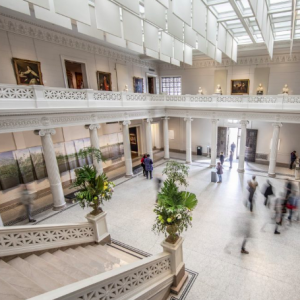
NOMA’s galleries will reopen on July 8 with new Covid-19 safety protocols and a prepaid, contactless ticketing option.
The New Orleans Museum of Art will be launching the Creative Assembly Program Series in July 2020, a new monthly online forum which will bring together thought leaders, community representatives, and interdisciplinary creatives to explore the role of social justice and racial equity in the museum field. The series is the newest endeavor of the Creative Assembly Community Engagement Initiative. Launched in 2018, its expressed goal is to highlight and explore important ideas of our time.
“Thoughtful discourse is fundamental to who we are as an institution, and we are committed to developing content and collections through the lens of racial equity and social justice,” says Susan Taylor, Montine McDaniel Freeman Director of NOMA. “We look forward to launching this series to highlight and foster meaningful conversation and considerations that are critical to our community.”
The first program will kick off in early July with monthly discussions to follow through November. Each dialogue will be moderated by, and in collaboration with, a partner organization. Partner announcements for each program will be forthcoming, along with dates and access details ahead of each monthly discussion.
Additionally, the museum will reopen to the public on July 8. NOMA’s latest exhibitions, including Alia Ali: FLUX, Ancestors In Stone, Tina Freeman: Lamentations, and Torkwase Dyson: Black Compositional Thought | 15 Paintings for the Plantationocene will be open for visitors as the museum reopens following COVID-19 restrictions.
The monthly Creative Assembly Program Series schedule includes:
July – Exhibitions and Public Engagement
The stories told through museum exhibitions construct and inform how viewers see the world, and how they see themselves. Panelists will discuss the power of exhibitions and how stories communicated through exhibitions can effect change and impact lives.
August – Collections and Acquisitions
The permanent collections of encyclopedic museums have not traditionally represented the entire population those museums serve. Panelists will discuss the challenges presented by collections that have historically lacked non-white and non-male artists, and ideas for how museums can progress and maintain cultural relevance among diverse populations.
September – Museums and Local Arts Community
Museums serve to inspire connection and engage communities—work that often extends beyond the walls of the institution. Panelists will discuss the relationship between museums and local artists, the responsibility of museums to support local artists, and the role of museums in the arts community at large.
October – Diversity in the Art Museum Field
Those in the museum field are responsible for presenting and interpreting artworks that represent histories and cultures from around the world. And yet , the make-up of those positions is statistically homogeneous. Panelists will discuss diversity, inclusion and representation in the museum field, and how a more equitable approach creates ongoing opportunities for redressing systemic racism while better representing the community at large.
November – The Role of Art in Systemic Change
Art inspires. Art motivates. Art connects. Art heals. Panelists will discuss art’s role in addressing and influencing systemic transformation, and how museums can be a catalyst for change.
NOMA’s Creative Assembly Community Engagement Initiative uses neighborhood-based participatory art experiences as a vehicle for personal exploration, community collaboration, and social change. Through partnerships with community members, artists, community-based organizations and museum staff, the Creative Assembly Initiative facilitates community-generated art projects and programs in New Orleans neighborhood spaces and at NOMA.
Since its founding, the Creative Assembly Initiative has fostered conversations around an array of social justice-centered issues ranging from the power of collective action to the celebration and representation of underrepresented stories and identities. Through the Creative Assembly Initiative, NOMA has partnered with organizations including the Travis Hill School in the Orleans Justice Center, The Youth Empowerment Project, Nuestra Voz, The Rebuild Center, Dancing Grounds, NOVAC, New Harmony High School, and more. The Initiative is generously supported by The Wagner Foundation and The Collins C. Diboll Private Foundation.